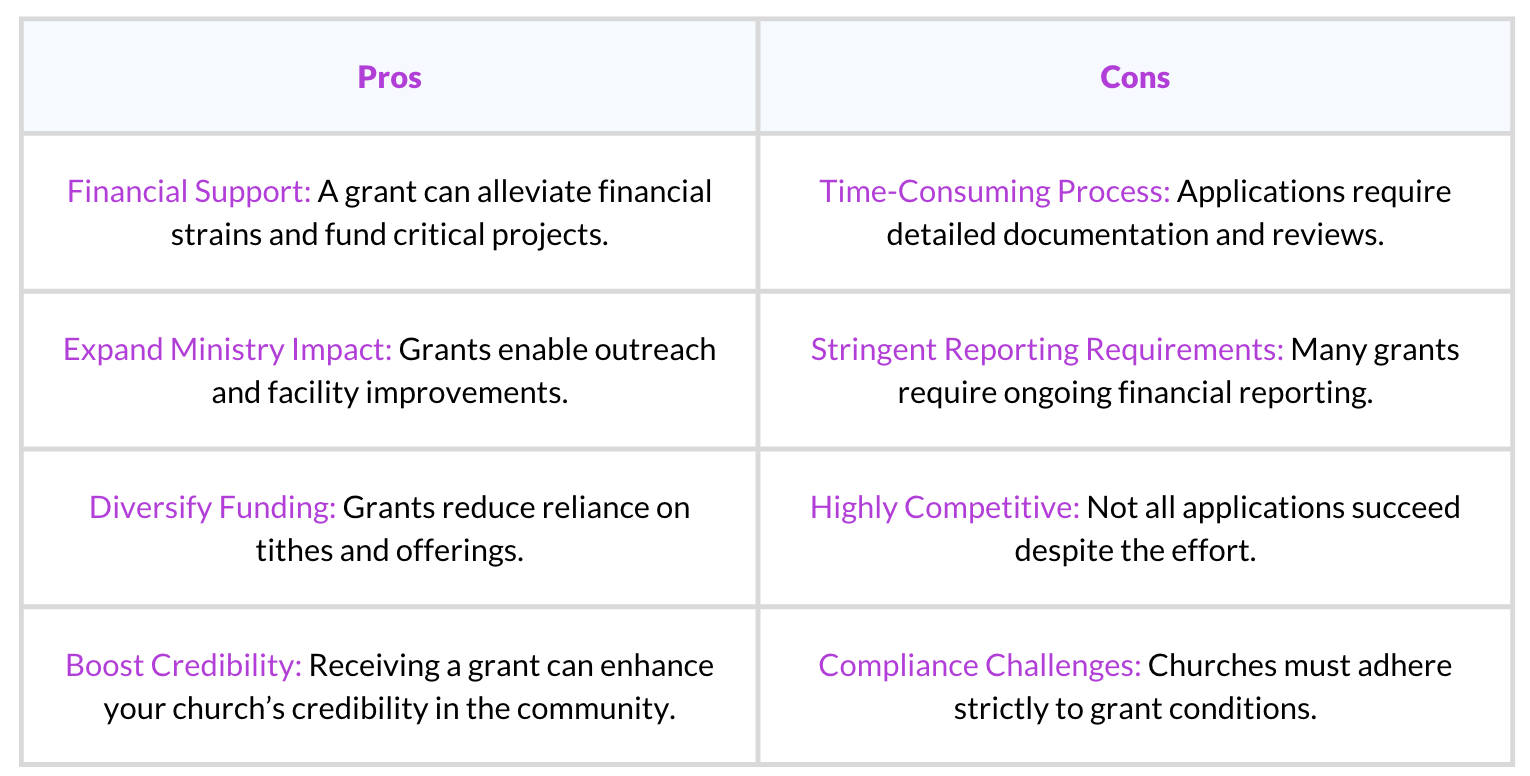Church grants aren’t always easy to secure, but they’re a game-changer for funding ministries. In this blog, we’ll break down what church grants are, how they work, the pros and cons of applying for them, and actionable steps to help you secure one.
In this post, we’ll dig into:
- What church grants are and how they can supplement your ministry’s finances.
- The pros and cons of applying for grants (and whether they’re worth your time).
- A curated list of grants you can apply for today.
- Actionable tips for writing winning grant proposals.
Let’s dive in so you can confidently take the next steps to support your ministry’s financial goals.
What Are Church Grants?
Church grants are financial gifts provided by governments, foundations, or organizations to help churches support their ministries. These grants can be used for a variety of purposes, such as:
• Building maintenance and repairs
• Launching community outreach programs
• Expanding ministry staff (e.g., hiring interns or additional team members)
• Supporting innovative ministry projects
For example, if your church is struggling to fund a neighborhood outreach program or repair your building’s roof, a grant could be the solution to ease financial pressure. While applying for grants often requires time and effort, the benefits can outweigh the challenges if you prepare properly.
The Pros and Cons of Church Grants
Church grants can be a huge blessing, but they also come with challenges. Here’s what to consider before pursuing a grant:

Church Grants Worth Exploring
If you’re interested in applying for a church grant but don’t know where to start, here are some great options to consider:
- AmeriCorps VISTA
- Purpose: Supports nonprofit capacity-building initiatives.
- Amount Available: Modest living allowance for volunteers, plus education awards.
- Eligibility: Nonprofit organizations, including churches.
- Deadline: Varies by program.
- Learn More: AmeriCorps VISTA
- Lilly Endowment Clergy Renewal Program
- Purpose: Provides funds for pastoral sabbaticals and interim staffing.
- Amount Available: Up to $50,000 per congregation.
- Eligibility: Christian congregations in the U.S.
- Deadline: Rolling applications.
- Learn More: Lilly Endowment
- Walmart Foundation Community Grants
- Purpose: Funds community outreach projects.
- Amount Available: Up to $5,000 per grant.
- Eligibility: Nonprofit organizations, including churches.
- Deadline: Rolling applications.
- Learn More: Walmart Community Grants
- National Fund for Sacred Places
- Purpose: Provides grants to preserve historic churches.
- Amount Available: $50,000–$500,000.
- Eligibility: Historic congregations of all denominations in the U.S.
- Deadline: Annually, dates vary.
- Learn More: National Fund for Sacred Places
- Youth Service America (YSA) Grants
- Purpose: Supports youth-led community service projects.
- Amount Available: $250–$1,500.
- Eligibility: Nonprofits and churches.
- Deadline: Varies.
- Learn More: Youth Service America Grants
How to Write a Winning Grant Proposal
Securing a grant starts with writing a strong proposal. Here are the essential steps:
Review Eligibility Requirements
Before applying, ensure your church meets the grant’s criteria. Failing to meet eligibility requirements can result in wasted time and effort.
Gather Necessary Documents
Compile financial statements, project plans, and other required materials in advance. Being organized will help you complete the application efficiently.
Understand the Guidelines
Read the grant’s application instructions thoroughly. Many grant applications are disqualified simply because applicants don’t follow the rules.
Craft a Strong Proposal
- Write a clear and compelling project plan that outlines:
- The specific problem your church is addressing.
- Your proposed solution and how the grant will be used.
- The anticipated impact on your church and community.
Highlight the Community Impact
Use data and examples to demonstrate how the grant will make a tangible difference in your community. Funders want to see that their money will have a meaningful impact.
Submit on Time
Deadlines are non-negotiable for most grants. Submit your application early to avoid last-minute issues.
Six Best Practices for Applying for Church Grants
1. Tailor Your Application
Customize each application to fit the specific goals and focus of the grant. Don’t send generic proposals.
2. Use Simple Language
Avoid jargon and church-specific terms that funders may not understand. For example, instead of “fellowship,” use “community gathering.”
3. Engage with Funders
Attend informational webinars or reach out to grant representatives with questions. Building a relationship with the funding organization can make a difference.
4. Demonstrate Financial Responsibility
Show that your church can manage funds effectively with a history of financial accountability.
5. Be Persistent
If your application is denied, don’t give up. Seek feedback, refine your proposal, and apply again.
6. Proofread and Refine
Have multiple people review your application for clarity and completeness before submitting. A polished proposal makes a better impression.
Enhance Your Church’s Financial Management
Managing church grants and other finances doesn’t have to be overwhelming. With tools like SteepleMate, you can centralize your financial tracking, simplify reporting, and spend more time focusing on ministry.
Learn more about SteepleMate today!

